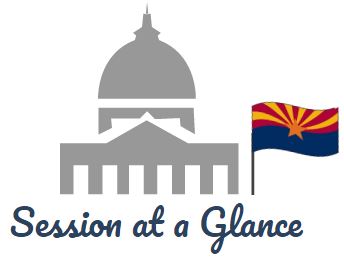April 02,2018 | Triadvocates

1. The official Sine Die pool has started in the House of Representatives—a welcomed indication that we are nearing the finish line. If you’re the betting type and have a buck to spare, you can be part of the pool in which the closest to predict the finish (date and exact time) wins the pot. Most are predicting (read: hoping) for the session to end in the next three weeks. However, executive and legislative leaders want some big-ticket items before they wrap up for the year. Gov. Doug Ducey wants changes in how we manage our water—and also just introduced a school safety proposal in response to the gun violence epidemic facing the nation. Senate President Steve Yarbrough is looking to reform tax credits for school tuition organizations, and House Speaker JD Mesnard wants to ask voters to install a new independent redistricting commission. Mix that with the digital goods tax bill that has yet to reach consensus amongst a broad range of stakeholders and a couple other issues being pushed by individual members as passion projects, and we might be in for some very late nights if they insist on finishing before May.
2. Following several community meetings to gather input on its four-year plan for the Central Avenue Light rail extension to south Phoenix, the City of Phoenix will take public comment at the formal City Council meeting on April 4 at 2:30 p.m. in the Council Chambers. The top issue of contention is the proposed two-lane reduction on Central Avenue, which currently has four lanes for vehicular traffic. The proposal is receiving backlash from business owners and community members who argue that the two-lane reduction will be detrimental for their businesses. Opponents feel that the proposed plan was developed without adequate community input and, as a result, have filed a petition with the City of Phoenix demanding that the city keep the four traffic lanes and suspend any further development until the community discontent is resolved. Former Arizona congressman Ed Pastor is expected to attend the meeting to speak on the issue. Interested parties who cannot be there can submit comments to: council.district.8@phoenix.gov
3. An Arizona Public Service Company (APS) customer has initiated a legal review of the company’s recent rate increase that was approved by the Arizona Corporation Commission (ACC). Using A.R.S. §40-246, the customer gathered a minimum of 25 signatures from impacted parties and is arguing that actual rate increase, which impacts the 1.2 million customers of APS, is much higher than the 4 percent projection presented during the rate case. Adam Stafford, former advisor to Arizona Corporation Commissioner Bill Mundell is the legal counsel for the customer. Administrative Law Judge Jane Rodda set a deadline of April 27 for intervenors in the case and the tentative start date for the hearing is Sept. 24.
4. Last week, the Maricopa Association of Governments (MAG) named MAG Transportation Director Eric Anderson as the new Executive Director. Current Executive Director Dennis Smith is retiring, effective April 6, after 41 years of service to MAG. Anderson began working with MAG in 1983 as a consultant, and was hired in 2000 to lead transportation initiatives for the organization. In addition to his role at MAG, Anderson served as interim CEO at Valley Metro before Scott Smith was permanently appointed in 2016.
5. Last week, a federal judge ruled that Prop. 123 – the voter-approved education funding plan used by Gov. Doug Ducey to increase aid to schools – is unconstitutional. In a 35-page order, U.S. District Court Judge Neil Wake said the funding mechanism violated federal law, ruling that the state was required to get approval from Congress before drawing down the principal of the trust. While the Governor’s Office maintains there is a provision buried in recent federal legislation retroactively authorizing the funding scheme, the potential fallout from the ruling remains unclear. The decision throws into question whether the state might have to repay $344 million or more taken from the state land trust to fund education since the proposition passed.
If you’re not familiar with the ongoing saga surrounding Prop. 123, here’s the rundown: In 2016, the governor pitched an education funding plan to use the state trust land endowment fund to settle a long-standing lawsuit over the amount schools were owed from under-funding of voter-mandated inflation increases during the Great Recession. As background, the federal government gave Arizona 10 million acres when it became a state in 1912, with the restriction that it be held for the benefit of certain beneficiaries, mostly public schools. About 9.2 million acres remain, and roughly $4.8 billion in the trust made up of the proceeds from sales and leases of the land. Adding another layer of contention is the fact that state Treasurer Jeff DeWit told lawmakers in 2016 — before the measure went to voters — that the proposal was unconstitutional.


In the House Appropriations Committee, after Republican Rep. Heather Carter referenced an offline conversation she had with Democratic Rep. Ken Clark, who claims he did not agree to a controversial provision included in the strike-everything amendment to SCR1010 concerning redistricting:
Rep. Clark: “I’ll answer that question as soon as I get out from under this bus that’s on top of me.”

Pictured above, left to right: Meg Reilly, Susan Nelson, Patti Alderson
TRIADVOCATES was a sponsor of Easter baskets for 40 children at the Changing Lives Center at Phoenix Rescue Mission this year. The effort was organized by legislative assistants Meg Reilly and Susan Nelson (pictured above), and our very own Patti Alderson assisted with assembly.
